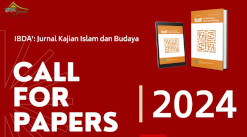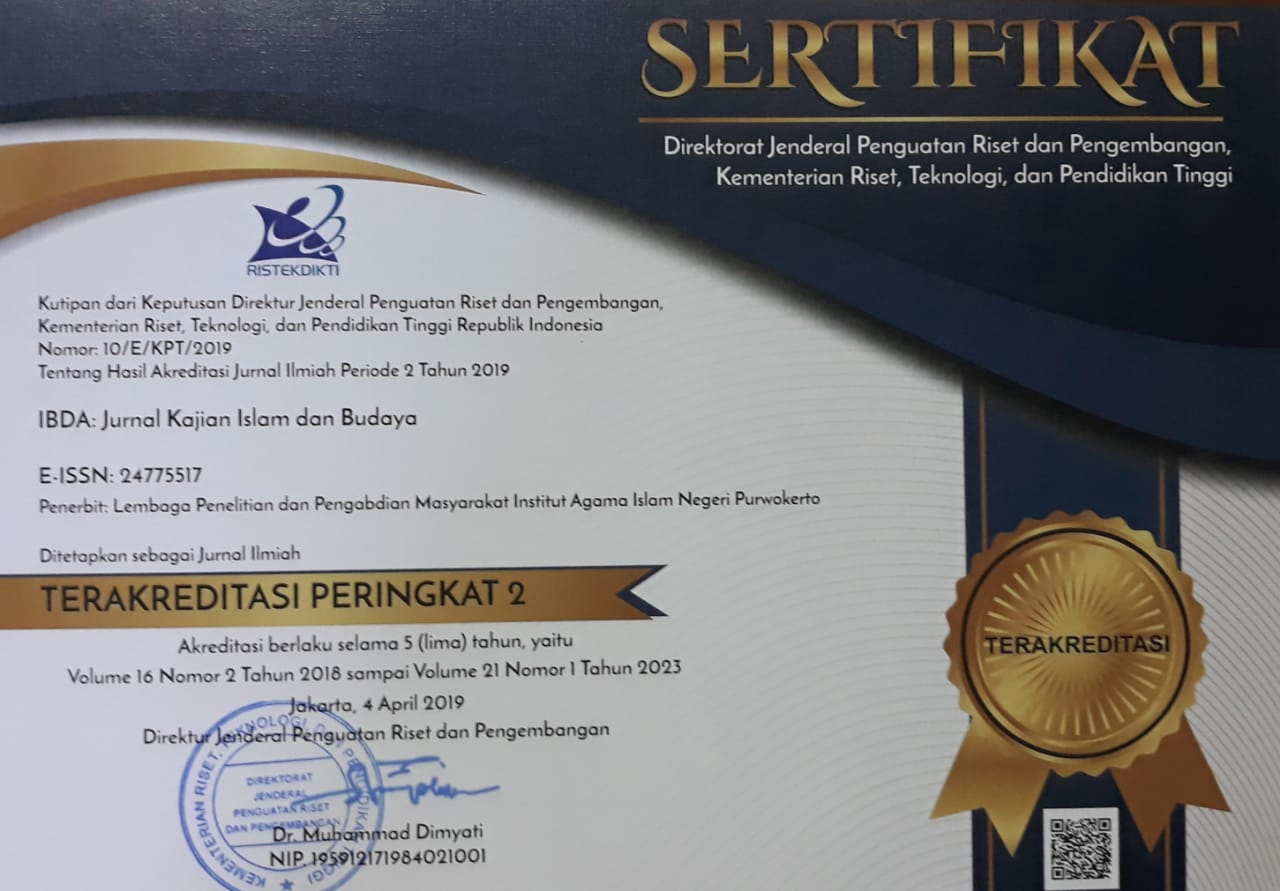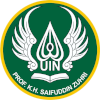JAVANESE ISLAM DURING MANGKUNEGARA I LEADERSHIP
DOI:
https://doi.org/10.24090/ibda.v17i1.2238Keywords:
Mangkunegara I, Islam, manuscript, discourse, JavaAbstract
Religion is the main aspect in constructing a discourse because the Javanese society in the 18th are thickly related with religiosity (Islam) as an inherited principle from the previous king. Mangkunegara I is an influential and interesting figure in the history of Javanese leadership relating to Islam. The medium used in the Islamization process by Mangkunegara I are through art, culture, customs and Islamic religious education. This study aims to show the Javanese Islamic discourse during the leadership of Mangkunegara I in the Babad Kemalon (Pakunegara)/ BK manuscript. The BK manuscript is a Javanese manuscript contains of 30 macapat songs which tells about the struggle of R.M. Said until entitled Mangkunegara I. this research uses the cultural studies paradigm. The theory used is the discourse theory proposed by Michael Foucault. The method used is a qualitative method and the data analysis techniques are done descriptively and interpretatively. This research belongs to library research. The result shows how the leadership of Mangkunegara I was able to show its discourse in Javanese Islam, which was manifested by the way of Mangkunegara I leaderships towards himself, his families, and people. As well as the Islamic base struggle which is always emphasized by Mangkunegara I.Downloads
Download data is not yet available.
References
Arifin, M.T. (1989). Puro Mangkunegaran dan Perubahan Sosial: Perspektif KGPAA Mangkunegoro I. Simposium Nasional Pangeran Sambernyawa, Surakarta: Universitas Muhammadiyah Surakarta.
Barker, Chris.2000. Cultural Studies, Teori dan Praktik. Yogyakarta: PT. Bentang Pustaka.
Barthes, R. 2007. Membedah Mitos-Mitos Budaya Massa: Semiotika atau Sosiologi Tanda, Simbol, dan Representasi. Terj. Yogyakarta: Jalasutra.
Doniger,W & Wedemeyer,C.K. 2010. Hermeneutics, Politics and the History of Religions: The Contested Legacies of Joachim Wach & Mircea Eliade. Oxford University Press.
Fachry, A. (1986). Refleksi Paham Kekuasaan Jawa dalam Indonesia Modern. Jakarta: Gramedia.
Hijazi, A.T. 2015. “Tariq bin Ziyad – The conqueror of Spain†from http://www.arabnews.com/islam-perspective/news/750016 Retrived 1 Februari 2019.
Jannah,M. 2012. “Kisah Ksatria Thariq bin Ziyad Saat Menaklukkan Andalusia†from http://www.voa-islam.com/read/mujahid/2012/09/28/20898/kisah-ksatria-thariq-bin-ziyad-saat-menaklukkan-andalusia/;#sthash.PTTgwd3e.dpbs Retrieved 1 Februari 2019.
Lubis, Y. A. 2014. Teori dan Metodologi Ilmu Pengetahuan Sosial Budaya Kontemporer. Jakarta: Rajawali Pers.
N.N. (1978). Tri Dharma: Tiga Dasar Perjuangan Pangeran Sambernyawa. Surakarta: Yayasan Mangadeg.
Pitana, T. S. 2014. Teori Sosial Kritis Metode dan Aplikasinya, Purwokerto: STAIN Press.
Poerwadarminta,W.J.S. 1939. Baoesastra Jawa. Batavia: J.B. Wolteras’Uitgevers Maatschappij.
Prawiroatmodjo, S. 1985, Bausastra Jawa-Indonesia, Jakarta: PT. Gunung Agung.
Ratna, N. K. 2007. Sastra dan Cultural Studies Representasi Fiksi dan Fakta, Yogyakarta: Pustaka Pelajar.
Soedarmono, dkk. 2011. Tata Pemerintahan Mangkunegaran. Jakarta: Balai Pustaka.
Soeharto, D. 1981. Babad Kemalon (Pakunagara) I, Jakarta: Depdikbud.
Soeharto, D. 1981. Babad Kemalon (Pakunagara) II, Jakarta: Depdikbud.
Tarigan, E. 2017. A Critical Discourse Analysis: Leadership Model as Reflected in Local Wisdom of Karonese. Advances in Social Science, Education and Humanities Research, 104, 48-50.
Yahya, I. 2016. “ Kebangkitan Muslim Tradisional Di Surakarta†dalam Jurnal Ibda’ edisi Vol 14, No.1, Januari-Juni 2016.
Zainuddin, Fananie. 1994. Pandangan Dunia KGPAA Hamengkoenagoro I Dalam Babad Tutur. Surakarta: Muhammadiyah University Press.
Barker, Chris.2000. Cultural Studies, Teori dan Praktik. Yogyakarta: PT. Bentang Pustaka.
Barthes, R. 2007. Membedah Mitos-Mitos Budaya Massa: Semiotika atau Sosiologi Tanda, Simbol, dan Representasi. Terj. Yogyakarta: Jalasutra.
Doniger,W & Wedemeyer,C.K. 2010. Hermeneutics, Politics and the History of Religions: The Contested Legacies of Joachim Wach & Mircea Eliade. Oxford University Press.
Fachry, A. (1986). Refleksi Paham Kekuasaan Jawa dalam Indonesia Modern. Jakarta: Gramedia.
Hijazi, A.T. 2015. “Tariq bin Ziyad – The conqueror of Spain†from http://www.arabnews.com/islam-perspective/news/750016 Retrived 1 Februari 2019.
Jannah,M. 2012. “Kisah Ksatria Thariq bin Ziyad Saat Menaklukkan Andalusia†from http://www.voa-islam.com/read/mujahid/2012/09/28/20898/kisah-ksatria-thariq-bin-ziyad-saat-menaklukkan-andalusia/;#sthash.PTTgwd3e.dpbs Retrieved 1 Februari 2019.
Lubis, Y. A. 2014. Teori dan Metodologi Ilmu Pengetahuan Sosial Budaya Kontemporer. Jakarta: Rajawali Pers.
N.N. (1978). Tri Dharma: Tiga Dasar Perjuangan Pangeran Sambernyawa. Surakarta: Yayasan Mangadeg.
Pitana, T. S. 2014. Teori Sosial Kritis Metode dan Aplikasinya, Purwokerto: STAIN Press.
Poerwadarminta,W.J.S. 1939. Baoesastra Jawa. Batavia: J.B. Wolteras’Uitgevers Maatschappij.
Prawiroatmodjo, S. 1985, Bausastra Jawa-Indonesia, Jakarta: PT. Gunung Agung.
Ratna, N. K. 2007. Sastra dan Cultural Studies Representasi Fiksi dan Fakta, Yogyakarta: Pustaka Pelajar.
Soedarmono, dkk. 2011. Tata Pemerintahan Mangkunegaran. Jakarta: Balai Pustaka.
Soeharto, D. 1981. Babad Kemalon (Pakunagara) I, Jakarta: Depdikbud.
Soeharto, D. 1981. Babad Kemalon (Pakunagara) II, Jakarta: Depdikbud.
Tarigan, E. 2017. A Critical Discourse Analysis: Leadership Model as Reflected in Local Wisdom of Karonese. Advances in Social Science, Education and Humanities Research, 104, 48-50.
Yahya, I. 2016. “ Kebangkitan Muslim Tradisional Di Surakarta†dalam Jurnal Ibda’ edisi Vol 14, No.1, Januari-Juni 2016.
Zainuddin, Fananie. 1994. Pandangan Dunia KGPAA Hamengkoenagoro I Dalam Babad Tutur. Surakarta: Muhammadiyah University Press.
Downloads
Published
2019-07-15
How to Cite
Kriskartika, S. A., Pitana, T. S., & Susanto, S. (2019). JAVANESE ISLAM DURING MANGKUNEGARA I LEADERSHIP. IBDA` : Jurnal Kajian Islam Dan Budaya, 17(1), 60–78. https://doi.org/10.24090/ibda.v17i1.2238
Issue
Section
Articles
License
Authors who publish with this journal agree to the following terms:
- Authors retain copyright and grant the journal right of first publication with the work simultaneously licensed under a Creative Commons Attribution-ShareAlike License a that allows others to share the work with an acknowledgement of the work's authorship and initial publication in this journal.
- Authors are able to enter into separate, additional contractual arrangements for the non-exclusive distribution of the journal's published version of the work (e.g., post it to an institutional repository or publish it in a book), with an acknowledgment of its initial publication in this journal.
- Authors are permitted and encouraged to post their work online (e.g., in institutional repositories or on their website) before and during the submission process, as it can lead to productive exchanges, as well as earlier and greater citation of published work (See The Effect of Open Access).

















